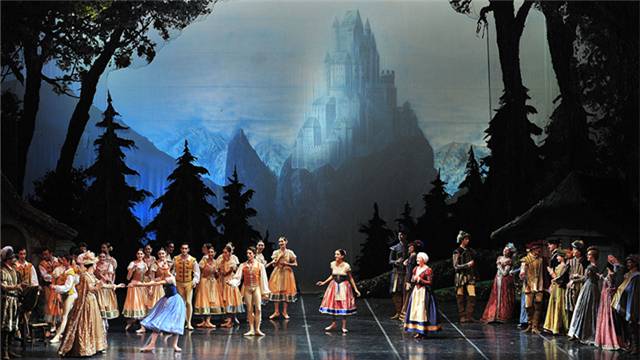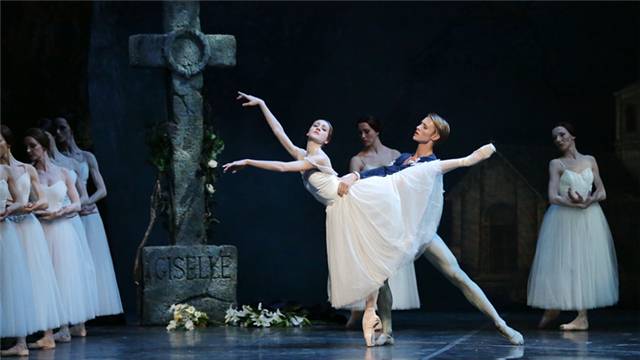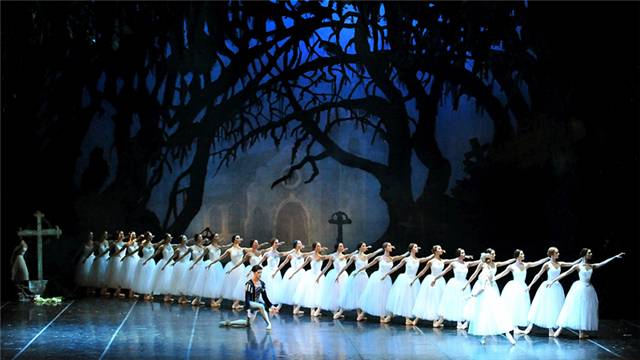
Teatro alla Scala Ballet Company: Giselle
Venue:
Shanghai Grand Theatre Lyric Theatre
300 Renmin Da Dao, near Huangpi Bei Lu Huangpu Shanghai
Date:
3/21/2024 - 3/24/2024

Teatro alla Scala Ballet Company: Giselle
3/21/2024 - 3/24/2024
Shanghai Grand Theatre Lyric Theatre
300 Renmin Da Dao, near Huangpi Bei Lu Huangpu Shanghai
¥180 - ¥1280
Event details
⚠️ A Ticket Code Will be Sent to You Within 1 Working Day after the Order is Placed via SMS beginning with "麦座"
👉 Use the Ticket Code to Pick Up Paper Ticket at the Ticket Machine of Shanghai Grand Theater
👉 Children Under 1.2m Are Not Allowed to Enter
👉 Each Attendee Requires A Ticket
👉 No Cancellation
👉 Use the Ticket Code to Pick Up Paper Ticket at the Ticket Machine of Shanghai Grand Theater
👉 Children Under 1.2m Are Not Allowed to Enter
👉 Each Attendee Requires A Ticket
👉 No Cancellation

Conductor: Valery Ovsyanikov
Director: Manuel Legris
Performed by Teatro alla Scala Ballet Company
Orchestra: Shanghai Opera House Orchestra
Music:Adolphe Adam
Set and costumes design: Aleksandr Benois
Elaborated: Angelo Sala and Cinzia Rosselli
Light design:Marco Filibeck
Giselle: Nicoletta Manni/Martina Arduino/Vittoria Valerio
Albrecht: Timofej Andrijashenko/Nicola Del Freo/Claudio Coviello
Myrtha, Queen of the Willis: Maria Celeste Losa/Alice Mariani
*All information on artists and duration is subject to change.


Synopsis
ACT I
The peasants of a Rhineland village are celebrating the vintage festival. A young nobleman, prince Albrecht, disguised under the name of Loys, pays court to a girl named Giselle, who accepts. But the gamekeeper Hilarion, who suspects Loys’ true identity and is jealous of him, awaits the propitious moment to get his revenge. Giselle is happy and pays no heed to the advice and warnings of her mother, who puts her on her guard by telling her the story of the Willi, the maidens who died before marriage and who, transformed into spirits, lure the men whom they encounter by night and compel them to dance to death. Meanwhile a procession of nobles who have been hunting arrives at the village, in attendance upon the duke of Courland and his daughter Bathilde, who is engaged to Albrecht. Giselle confides to the young lady that she has fallen in love. She receives a wedding present, but Hilarion chooses this moment to appear, revealing that Albrecht and Loys are the same person. The prince cannot deny it. Giselle, who feels betrayed in her most cherished and pure sentiment, goes out of her mind. In a wild dance, she tries to kill herself with Albrecht’s sword, then she goes mad and dies of a broken heart.
ACT II
ACT II
Some time has passed, and Albrecht, seized with remorse, returns to the village. Here the magic spell is cast by the Willi maidens, who, led by their imperious queen Myrtha, come out of their tombs by night. Albrecht finds Giselle again, but is condemned to dance until he dies, as is the gamekeeper Hilarion. In vain the prince begs Myrtha to forgive him: the law of the Willi maidens is inflexible. Giselle herself, however, saves him by helping him to resist and dancing with him until the sun rises. When the spell comes to an end, Albrecht finds himself in the village, alone with his remorse.
The Ballet Company of Teatro alla Scala
The Ballet Company of Teatro alla Scala has a glorious past dating back to the centuries prior to the opening in 1778 of the world’s most celebrated musical theatre, which is still its home today. Even before the founding of the Imperial-Royal Academy of Ballet of La Scala in 1813, eminent choreographers such as Gasparo Angiolini and Salvatore Viganò held great influence over European ballet. Then, the illustrious teacher and theorist, Carlo Blasis, introduced the ballet into the Romanticist atmosphere, thus contributing to the technical innovation of its style. Enrico Cecchetti took the Italian style of teaching academic technique to Russia, from where it evolved around the world thanks to Sergei Diaghilev’s Ballets Russes which he joined before ending his career at La Scala.
And so, the Ballet Company of La Scala entered the twentieth century, thanks also to remarkable choreographers from Diaghilev’s company such as Mikhail Fokin and Léonide Massine. New names arrived from the worlds of the free and expressionist dance of Central Europe, names such as Aurel Milloss, whom Arturo Toscanini charged with the task of rebuilding the Company following the Second World War. For his repertoire, Milloss invited great musicians and celebrated set designers and painters, as well as illustrious guests such as George Balanchine. In the 1950s and 1960s, La Scala became a stage open to the stars of the world of ballet. The choreographers Roland Petit and Maurice Béjart debuted in 1963 and 1971 respectively, while the étoiles included Carla Fracci, Liliana Cosi, Luciana Savignano, Paolo Bortoluzzi. Guest appearances were made by Margot Fonteyn and Yvette Chauviré, as well as Rudolf Nureyev, who became closely associated with La Scala from 1965, as did Alessandra Ferri in the 1990s.
More recently, the Ballet Company of La Scala has grown in international visibility, performing at the Paris Opéra, in the United States, at the Bolshoi in Moscow and the Mariinsky-Kirov Theatre in Saint Petersburg, in Germany, Turkey, Brazil, Spain, Mexico, China and Australia. The expressive and technical appeal are guaranteed by three star names: Svetlana Zakharova, Roberto Bolle and Massimo Murru. But even some young principal dancers, soloists and members of the corps de ballet have been included in leading roles, initially by the much-loved Elisabetta Terabust, former director at La Scala (from 1993 to 1997, and again in 2007-2008) who recently died, and then by Makhar Vaziev (from 2009 to 2015), who also opted for internationally much-sought-after guests. In the conviction that, overall, a company should excel in rigour and versatility, great conductors have been called to the podium for the ballet, a further attraction for a Theatre and central to international musical life. An Italian, Mauro Bigonzetti, has alternated with Vaziev, albeit for only one season. Since October 2016, the leadership of the Ballet Company has again been entrusted to Frédéric Olivieri, previously director between 2002 and 2007. With renewed energy, he has enlarged the hierarchy and, today, among the principal dancers are to be found Nicoletta Manni, Claudio Coviello, Virna Toppi, Martina Arduino and Timofej Andrijashenko, while some of the soloists include names such as Massimo Garon, Marco Agostino, Vittoria Valerio, Federico Fresi, Alessandra Vassallo, Christian Fagetti, Nicola Del Freo and Maria Celeste Losa. From the ranks of the corps de ballet, young dancers are emerging, trained at the Ballet School, which is the Company’s - but not only - main source of new members, while also prominent entrées are frequently reserved for “additional dancers”. Olivieri is working to complement the academic repertoire with creations dedicated to the Ballet Company of La Scala: indeed, a great Company is distinguished by the care and attention it devotes to its young talents and by its ability to project itself towards ballet that reflects our times.
And so, the Ballet Company of La Scala entered the twentieth century, thanks also to remarkable choreographers from Diaghilev’s company such as Mikhail Fokin and Léonide Massine. New names arrived from the worlds of the free and expressionist dance of Central Europe, names such as Aurel Milloss, whom Arturo Toscanini charged with the task of rebuilding the Company following the Second World War. For his repertoire, Milloss invited great musicians and celebrated set designers and painters, as well as illustrious guests such as George Balanchine. In the 1950s and 1960s, La Scala became a stage open to the stars of the world of ballet. The choreographers Roland Petit and Maurice Béjart debuted in 1963 and 1971 respectively, while the étoiles included Carla Fracci, Liliana Cosi, Luciana Savignano, Paolo Bortoluzzi. Guest appearances were made by Margot Fonteyn and Yvette Chauviré, as well as Rudolf Nureyev, who became closely associated with La Scala from 1965, as did Alessandra Ferri in the 1990s.
More recently, the Ballet Company of La Scala has grown in international visibility, performing at the Paris Opéra, in the United States, at the Bolshoi in Moscow and the Mariinsky-Kirov Theatre in Saint Petersburg, in Germany, Turkey, Brazil, Spain, Mexico, China and Australia. The expressive and technical appeal are guaranteed by three star names: Svetlana Zakharova, Roberto Bolle and Massimo Murru. But even some young principal dancers, soloists and members of the corps de ballet have been included in leading roles, initially by the much-loved Elisabetta Terabust, former director at La Scala (from 1993 to 1997, and again in 2007-2008) who recently died, and then by Makhar Vaziev (from 2009 to 2015), who also opted for internationally much-sought-after guests. In the conviction that, overall, a company should excel in rigour and versatility, great conductors have been called to the podium for the ballet, a further attraction for a Theatre and central to international musical life. An Italian, Mauro Bigonzetti, has alternated with Vaziev, albeit for only one season. Since October 2016, the leadership of the Ballet Company has again been entrusted to Frédéric Olivieri, previously director between 2002 and 2007. With renewed energy, he has enlarged the hierarchy and, today, among the principal dancers are to be found Nicoletta Manni, Claudio Coviello, Virna Toppi, Martina Arduino and Timofej Andrijashenko, while some of the soloists include names such as Massimo Garon, Marco Agostino, Vittoria Valerio, Federico Fresi, Alessandra Vassallo, Christian Fagetti, Nicola Del Freo and Maria Celeste Losa. From the ranks of the corps de ballet, young dancers are emerging, trained at the Ballet School, which is the Company’s - but not only - main source of new members, while also prominent entrées are frequently reserved for “additional dancers”. Olivieri is working to complement the academic repertoire with creations dedicated to the Ballet Company of La Scala: indeed, a great Company is distinguished by the care and attention it devotes to its young talents and by its ability to project itself towards ballet that reflects our times.
Notice
Date:
Thursday, 21st March - Saturday, 23rd March @ 19:30
Sunday, 24th March @ 14:30
Price: 180/280/380/480/680/880/1080/1280
Duration: About 130 mins (incl. a 30 mins intermission)

Follow our WeChat for event news, deals, gossip and more!
Book Now
Teatro alla Scala Ballet Company: Giselle
Venue:
Shanghai Grand Theatre Lyric Theatre
300 Renmin Da Dao, near Huangpi Bei Lu Huangpu Shanghai
Date:
3/21/2024 - 3/24/2024
© 247tickets 2020 沪ICP备19024898号-2

 Add us on WeChat to speak to our friendly customer service team! ID: love247tickets
Add us on WeChat to speak to our friendly customer service team! ID: love247tickets